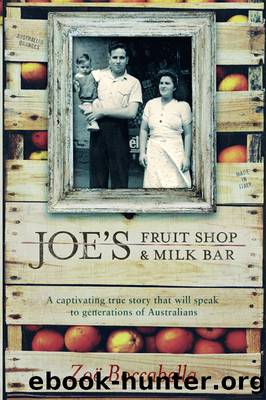Joe's Fruit Shop & Milk Bar by Zoe Boccabella

Author:Zoe Boccabella
Language: eng
Format: epub
Publisher: ABC Books
Published: 2014-01-15T00:00:00+00:00
For some time after the war ended, it seems no one spoke much of the internment. Even decades later, when I talked to Nonno Anni about it, he began by showing bravado and joked that it was his first holiday since travelling out on the boat from Italy, his making light of it hinting at how heâd come to handle with the ordeal. He went on to admit he felt sad he had lost those years when he was in the prime of life. Then heâd shrugged and intimated what could you do? He seemed philosophical, knowing that everyone was asked to make sacrifices because it was wartime, aware the broader community was affected, not just him and the other internees.
The fate of Italian migrant men in Australia during the Second World War panned out in roughly three ways. Some Australian-born Italians saw active service defending Australia. Others remained living and working in the community, sometimes due to the Catholic Church vouching for them. And then there were those sent to Australiaâs internment camps and the Civil Alien Corps (CAC), their incarceration varying in duration â some sent to help on farms when produce shortages began to occur; others forced to work years in CAC labour gangs, my Bisnonno Vitale included.
Nonno Anni insisted the soldiers guarding his camp treated him well, and he was fortunate to remain strong and healthy despite the crude living conditions and lack of sanitation in his camp. While being interned left its mark on his life, the carapace of youth perhaps shielded him a little. I believe it was harder for Bisnonno Vitale. Some people seem to be born into a timeline of challenge. Vitale was twenty when the First World War began, the prime age for conscription, and he served on the side of the Allies for the entire duration of the conflict. Next came the Depression and living away from his family for years at a stretch. And then, not long after, came the Second World War and years of internment and working in the CAC. By the time he was released he was over fifty.
Numerous Italian migrant women who were left to survive as best they could during their husbandsâ internment faced their own challenges as they grappled with running farms on their own or with small children â some to discover later that their husbands had been despatched to provide help on non-Italian-run farms. These women are inspiring, often having shown great strength and endurance as they toiled in the fields and taught themselves to drive or use machinery and sold their produce. At the same time they continued with their domestic chores in an era when doing the washing could take an entire day.
While most internees and their families quietly got on with their lives after the war ended â sometimes taking years to recover financially â a few found the experience too much.
âThere were some men from the camp who didnât do too well after they got out.â Nonno Anni sighed and refolded a paper serviette, tucking it under the saucer of his empty coffee cup.
Download
This site does not store any files on its server. We only index and link to content provided by other sites. Please contact the content providers to delete copyright contents if any and email us, we'll remove relevant links or contents immediately.
Still Foolin’ ’Em by Billy Crystal(36358)
We're Going to Need More Wine by Gabrielle Union(19046)
Plagued by Fire by Paul Hendrickson(17412)
Pimp by Iceberg Slim(14507)
Molly's Game by Molly Bloom(14145)
Becoming by Michelle Obama(10026)
When Breath Becomes Air by Paul Kalanithi(8446)
Educated by Tara Westover(8054)
The Girl Without a Voice by Casey Watson(7889)
The Incest Diary by Anonymous(7698)
Note to Self by Connor Franta(7671)
How to Be a Bawse: A Guide to Conquering Life by Lilly Singh(7486)
The Space Between by Michelle L. Teichman(6941)
What Does This Button Do? by Bruce Dickinson(6207)
Imperfect by Sanjay Manjrekar(5878)
Permanent Record by Edward Snowden(5847)
A Year in the Merde by Stephen Clarke(5430)
Shoe Dog by Phil Knight(5268)
Promise Me, Dad by Joe Biden(5153)
